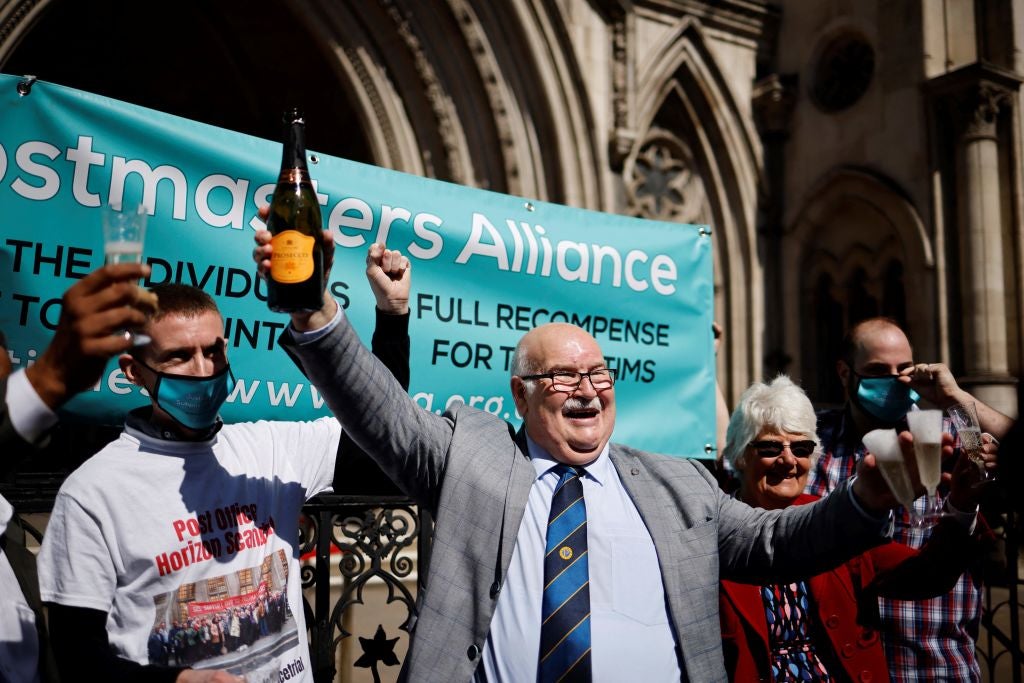Lawyers are key to the Post Office scandal inquiry as much as IT error is
It’s vital that we know whether what unfolded against 736 prosecuted postal workers was solely down to bad technology or an invidious legal process too, writes Chris Blackhurst


Owen Paterson was only one MP. Apparently, a grave injustice had been done to him so the prime minister, backed by the majority of Conservative MPs, went in to bat for the man.
Think, if such a fate was said to have befallen all 650 members of parliament, and for good measure, 86 life peers as well, what then? What would the fuss be like?
That number of Post Office workers were prosecuted, between 2000 and 2014, based on a faulty computerised accounting system. Unlike Paterson, the 736 really do have a case; theirs was a terrible miscarriage of justice that resulted in many of them facing financial ruin, mental health issues and social ostracisation. Some went to prison, while others were fined.
This week, six more subpostmasters had their convictions quashed, bringing the total cleared so far to more than 50, with more to come. A government scheme to provide financial compensation to the workers is up to 400 cases.
Meanwhile, an official inquiry is getting underway, chaired by retired High Court judge Sir Wyn Williams. His team are formulating the substantive issues to be explored, with a view to starting oral hearings early next year and submitting their findings to the business secretary next autumn.
There are encouraging signs, notably the waiving of privilege this week by three key institutions involved: the Post Office, government and Fujitsu, designer of the dodgy Horizon software.
But there is a fourth pillar in this scandal that is not so ready to play ball. These are the lawyers that advised the Post Office on the bringing of prosecutions. They were employed in-house or from up to six external law firms.
Unfortunately, in such inquiries, the lawyers and legal process rule the roost. It’s time this was changed
The Department for Business, Energy and Industrial Strategy, which oversees the Post Office, is pressing for their legal advice to be excluded from the investigation. It’s claiming examining the role of the lawyers would be too time-consuming and is better dealt with via regulatory action or bringing negligence claims.
Legal ethics expert, Professor Richard Moorhead of Exeter University, who led a panel of academics making a submission to the inquiry, said this cannot be allowed to happen. “It might be the management asked the lawyers to make some of these problems go away or it may be the lawyers came to management and said, ‘I think we can help these problems go away’,” he said.
The contention of Prof Moorhead and his colleagues is that the pursuit of the Post Office workers was a “lawyering scandal” as much as it was an IT-based one. They’ve suggested that some of the work before and since prosecutions was done “incompetently or unethically”.
Ever since the late Robert Maxwell’s lawyers successfully argued in 1969 that he be allowed to respond to intended criticisms of him in an official report before publication, our procedure for holding inquiries and reviews has been mired in legal process. Maxwell was slated in a Department of Trade and Industry report as being “unfit to hold the stewardship of a public company”. The publishing tycoon went to court and the judge found that the DTI had “virtually committed the business murder of Maxwell”.
Following the verdict, to avoid future subjects of reports doing the same, the policy was changed so they can be shown extracts from the report about them. What occurs then, of course, is that their lawyers wade in, complaining about what will be said and the report is watered down. It’s known as “Maxwellisation”. Given that Maxwell was subsequently discovered to have committed major fraud, it’s an unfortunate term, to say the least.

Clearly, the judge did not know then what was later unearthed regarding Maxwell’s business dealings. But his comment about the government committing business murder of the crook nevertheless does seem faintly ridiculous.
Unfortunately, in such inquiries, the lawyers and legal process rule the roost. It’s time this was changed. The Post Office scandal presents a situation in which legal privilege is being dropped. That’s all well and fine. But at the same time, the government is pressing for whole swathes of engagement between client and lawyer (the Post Office and its legal teams) to be taken away from the Williams review completely.
Behind the scenes, the lawyers are doubtlessly putting up a very strong fight as to why their conduct ought to be excluded. They will be claiming it’s being viewed out of context, that it may prejudice other proceedings or that the counsel they gave was done so on the ground it was privileged.
These are lines that are familiar to anyone who has been involved with similar probes over the years. The lawyers were all over Leveson, Chilcot and others. Their specialty is prevarication and obfuscation; they’re masters of the craft.
In this instance, it’s more invidious, in that the government department batting for the lawyers is the one that will receive Williams’s eventual report. At the heart of it all, are innocent Post Office employees whose lives were ruined. It’s vital that we know how much of what unfolded against them was really down to IT error and how much was down to humans at the Post Office pushing its lawyers, or the lawyers champing at the bit.
Williams should stand his ground and not allow the lawyers their say. They are the focus of his inquiry, as much as computer technology.




Join our commenting forum
Join thought-provoking conversations, follow other Independent readers and see their replies
0Comments